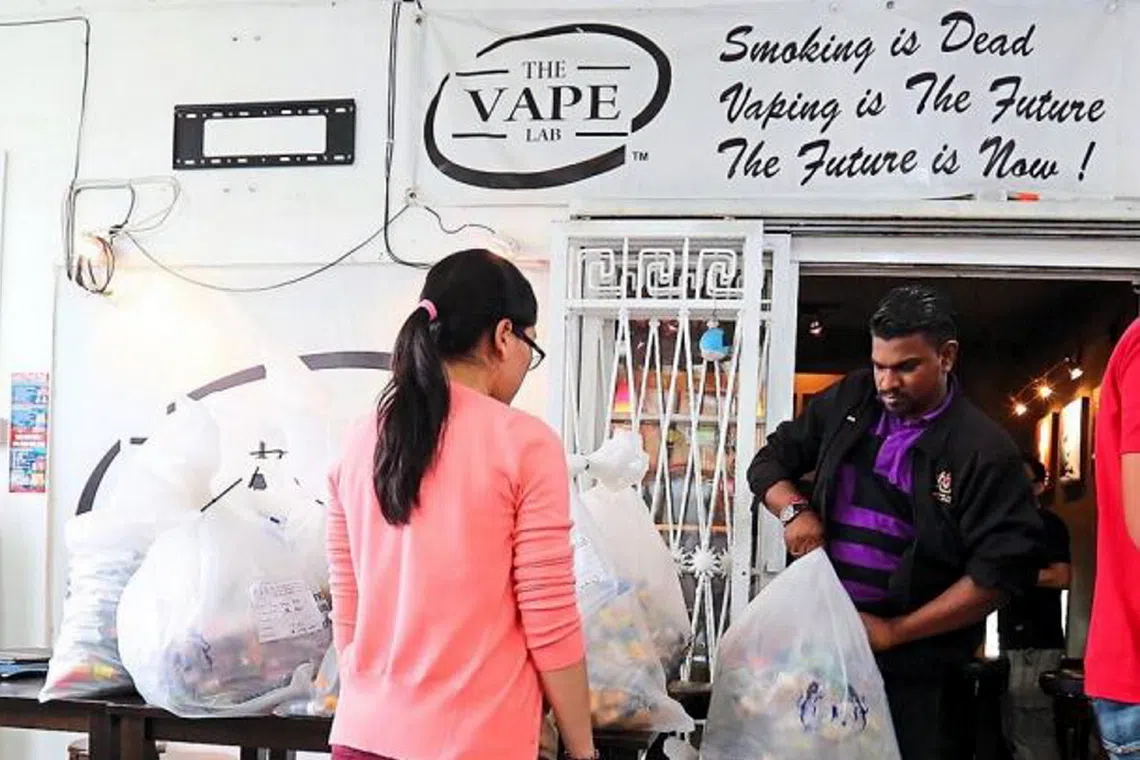Malaysia’s move towards nationwide vape ban draws mixed reaction from health experts, retailers
Sign up now: Get ST's newsletters delivered to your inbox

Malaysian officials taking away seized vape liquids and related products during a raid in Johor Bahru in 2015.
PHOTO: THE STAR/ASIA NEWS NETWORK
Follow topic:
- Malaysia will implement a phased ban on vaping, starting with "open-system" vapes, according to Health Minister Dzulkefly Ahmad.
- The ban aims to safeguard public health, with decisions to be made after a "thorough review".
- The move is lauded by health advocates but has met with resistance from the vape industry.
AI generated
KUALA LUMPUR – Malaysia is set to emulate neighbour Singapore and ban vaping, in an effort to curb rising misuse. The move, while lauded by health advocates, has met with resistance from the pro-vape lobby.
Health Minister Dzulkefly Ahmad said the implementation will be carried out in phases, starting with a ban on “open-system” vapes, before being expanded to cover all types of vape products.
Open-system vapes are reusable devices that can be manually refilled with any liquid or substance, unlike the closed-system vapes that are disposable and hence more popular with new and casual users due to the convenience.
Datuk Seri Dzulkefly was giving a written reply in Parliament on Sept 9 and 10 to queries about whether the government is prepared to ban vape sales, in line with measures taken by several state governments – Johor, Kelantan, Terengganu, Perlis, Kedah, and Pahang – to better safeguard public health against harmful diseases.
“A thorough review is being conducted to assess the effectiveness of existing controls and to draft a more comprehensive policy to safeguard the health of the people as a whole,” he wrote.
The Health Minister told the media on Sept 11 that the government is finalising a Cabinet paper to ban vaping nationwide, saying: “It is no longer if we ban, but when we ban.” More details will be given at a later date.
The vape industry has grown rapidly in Malaysia. It was valued at RM3.48 billion (S$1.1 billion) in 2023 compared with RM2.27 billion in 2019, according to the Malaysian Vape Chamber of Commerce.
And the 2023 Global Adult Tobacco Survey estimated that in a country of 34.2 million people, 1.4 million Malaysian adults use e-cigarettes.
The decision to move towards a total ban on the sale and use of vapes in Malaysia comes as Johor’s vape market continues to thrive despite a freeze on licences for vape businesses since 2016. This has kept supply lines open to Singapore, where vaping is totally banned.
In 2023, it was reported that customers from Singapore were ordering electronic vaporisers and e-liquids from online retailers in Malaysia, with delivery in Johor Bahru.
At present, Singaporeans are said to make up a chunk of the clientele for vape businesses across the border in Johor Bahru, according to shops in the southern Malaysian state, amid a sweeping clampdown on vape devices back in the Republic.
Nineteen large-scale vape smuggling cases were detected at Singapore’s air, land and sea checkpoints
In a joint media statement on Aug 26, Singapore’s Ministry of Health and the Health Sciences Authority said more than 3,700 people were also caught possessing or using vapes from April 1 to June 30.
This is an increase of almost 20 per cent from the previous quarter, when more than 3,100 people were caught, and also exceeds the 2,530 people caught in the same period in 2024.
Malaysia’s move towards a full vaping ban has not gone down well with pro-vape lobby groups such as the Malaysia Retail Electronic Cigarette Association (MRECA), which said that total prohibition could push the trade underground.
“If open-system vapes are banned, it will not solve the misuse problem. Consumers may end up exposed to products without knowing they contain illicit substances, leading to addiction,” MRECA president Adzwan Ab Manas told The Straits Times.
“If users still mix in drugs, then action should be taken against the offenders, not law-abiding retailers,” he said, suggesting that regulating sales of some Health Ministry-approved vape products be allowed in licensed shops.
Mr Mohamad, 45, who owns seven vape shops in the Klang Valley area, said he was perplexed by the sudden policy shift.
“There are many other harmful products on the market, like liquor and cigarettes, which studies have long shown to be dangerous. If the government is serious, it should ban those too,” he told ST.
He also expressed doubts about how the Malaysian authorities would enforce the vaping ban. “A total ban here will only fuel the black market,” said the shop owner, who declined to give his full name.
While vaping has been banned in Singapore since 2018, laws and regulations in Malaysia differ from state to state
Singapore announced on Aug 17 that it would toughen its stance on vaping
Meanwhile, health advocates in Malaysia have lauded the ban on vaping, calling it a timely move.
Dr Ng Kim Fong, a cardiologist and founder of the Johor Doctors Association, told ST: “Prevention is better than cure. It is best to ban these products now before they cause health issues, or, if illicit drugs are added, lead to abuse, aggression and more crime.”
Dr Helmy Haja Mydin, a lung specialist at Pantai Hospital Kuala Lumpur, echoed the sentiment.
“If the socio-economic costs are too great, we should not allow an industry to profit while the losses are borne by the government and society,” he added.
Additional reporting by Harith Mustaffa


